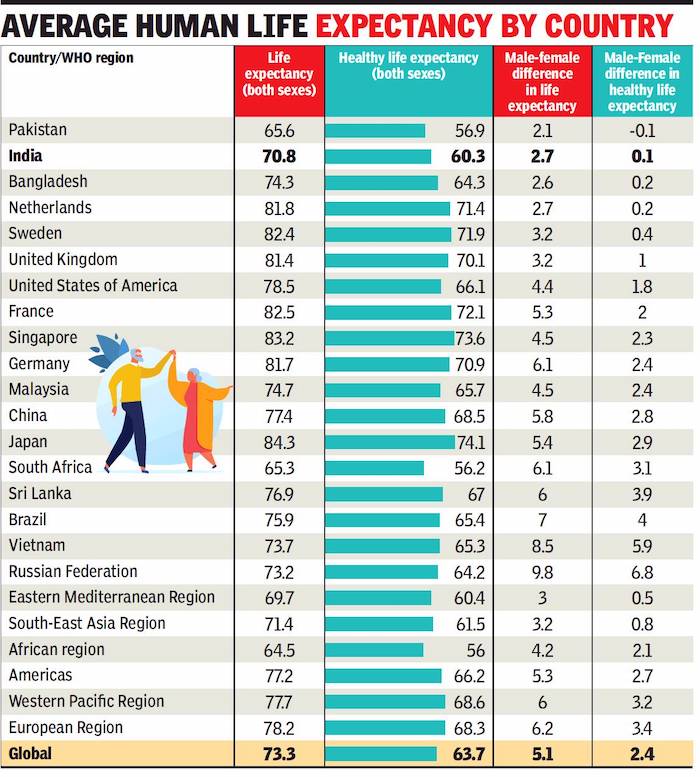Life Expectancy: South Asia
This is a collection of articles archived for the excellence of their content. the Facebook community, Indpaedia.com. All information used will be acknowledged in your name. |
Contents |
Changes over the years
1960- 2016
Source: World Bank
|
Country |
1960 |
2016 |
|
Afghanistan |
32 |
64 |
|
Bangladesh |
46 |
72 |
|
Bhutan |
35 |
70 |
|
China |
44 |
76 |
|
India |
41 |
69 |
|
Maldives |
37 |
77 |
|
Myanmar |
43 |
67 |
|
Nepal |
35 |
70 |
|
Pakistan |
45 |
66 |
|
Sri Lanka |
59 |
75 |
|
South Asia |
42 |
69 |
|
World |
53 |
72 |
Gender and Life Expectancy
South Asia and the world
2020-21
Rema Nagarajan, July 9, 2021: The Times of India

From: Rema Nagarajan, July 9, 2021: The Times of India
Females in India can expect on average to live almost three years longer than males. But when it comes to living a healthy life, the difference almost vanishes. This pattern of large gender differences in life expectancy but much smaller ones in healthy life expectancy is not unique to India. Public health experts say this phenomenon could be due to poorer access to healthcare and attention to health, especially among older women, reports Rema Nagarajan.
According to the World Health Statistics report of 2021, globally, women can expect to live an average five years longer than men, but when it comes to healthy life expectancy, that advantage shrinks to less than half as much at 2.4 years.
Global avg difference between life expectancy and healthy life expectancy is around 9 years
The data shows the global average difference between life expectancy and healthy life expectancy is around nine years, which means though life expectancy might be high, the last nine years would not be healthy.
Many health experts have expressed concern that health and medical research has focused overly on prolonging life rather than improving quality of old age. This matters most in the 30-odd countries that have life expectancy of 80 years or more. They witnessed a small improvement in life expectancy in 2012-19, but healthy life expectancy remained stagnant or even declined.
However, in less developed countries still struggling to increase life expectancy, the improvements in life expectancy and in healthy life expectancy seem to keep pace. In fact, several countries have recorded greater improvement in healthy life expectancy than in life expectancy.
In Oman and Afghanistan men have higher life expectancy than women. But in a dozen other countries, men have higher healthy life expectancy. Most of these are also those with poor gender equality. Countries where the difference in healthy life expectancy between men and women is most narrow include India, Pakistan and Bangladesh, sub-Saharan African countries and those in the Middle East.
“Women’s life expectancy is significantly higher than men’s, but this advantage does not translate to women having healthier lives. There are several reasons for this, including women’s lack of access and decision-making about health. The recently released Longitudinal Aging Survey of India reveals a high prevalence of reproductive health problems among older women. Older women also have a higher incidence of cardiovascular diseases,” explained Poonam Muttreja, executive director, Population Foundation of India.
Interestingly, in some of the most developed countries with the highest life expectancy, like Sweden, the Netherlands and Switzerland, the difference in healthy life expectancy between men and women is very slim compared to the difference in life expectancy.
India, South Asia and the world
1990, 2017

From: November 17, 2018: The Times of India
See graphic:
Life expectancy and healthy life expectancy in India, South Asia and the world: 1990, 2017
See also
Life Expectancy: South Asia